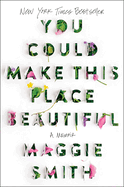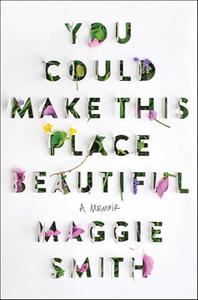
 "This isn't a tell-all," poet Maggie Smith (Goldenrod; Keep Moving) writes in the opening pages of her brilliant, beautiful memoir, You Could Make This Place Beautiful. It can't be, she argues, because she is not an omniscient narrator, she cannot know all, and because some of what she offers in the pages that follow is, in fact, an account of what she does not know. It's a "tell-mine" instead, a version of the pain and hardship brought on by the dissolution of her marriage--but also found in the marriage itself, in a life spent making herself small enough to fit inside of an institution and a partner that did not serve her, not really, or offer room for growth and expansion. "I've had to move into--and through--the darkness to find the beauty."
"This isn't a tell-all," poet Maggie Smith (Goldenrod; Keep Moving) writes in the opening pages of her brilliant, beautiful memoir, You Could Make This Place Beautiful. It can't be, she argues, because she is not an omniscient narrator, she cannot know all, and because some of what she offers in the pages that follow is, in fact, an account of what she does not know. It's a "tell-mine" instead, a version of the pain and hardship brought on by the dissolution of her marriage--but also found in the marriage itself, in a life spent making herself small enough to fit inside of an institution and a partner that did not serve her, not really, or offer room for growth and expansion. "I've had to move into--and through--the darkness to find the beauty."
You Could Make This Place Beautiful could easily be described as brutal in its telling. It is a brutal, and brutally honest, reflection on some of the lowest and hardest moments of Smith's life. But in that darkness, Smith finds--and shares--the promised beauty: in the soft fuzziness of her young son's earlobe, in learning to rollerblade during lockdown, in the cake dropped off by a neighbor on her first Christmas morning waking up without her kids. In these tellings, her memoir remains somehow soft in its brutality, yearning toward what is most human in us all: a desire to see and be seen, to understand and be understood. "I'm trying on so many metaphors, pushing toward understanding. I'm trying on so many lines written by others but through which I can see my own experience."
With an artist's eye for detail and a poet's way with words, Smith holds up the pain of her divorce and subsequent trials of forging a new life as a single mother. Within the context of this transformative time in her life, she offers readers glimpses of small moments of love and grief and joy and community and tears tucked in the crevices between large philosophies, belief systems and inheritances. The result is a memoir that is as much poetry as prose, a kaleidoscopic account of one woman's quest and questioning that will resonate with any reader, divorced or not, who has faced hardship, solitude or loss (or, particularly, all three). You Could Make This Place Beautiful makes a gift out of Smith's pain, tied up not in a neat bow, but offered with grace, humility and wonder as something to be treasured and held up gently, to see what it may reflect of ourselves when it touches the light. --Kerry McHugh, freelance writer
Shelf Talker: A brilliant and beautiful memoir from poet Maggie Smith reflects on the pain of divorce, and the unexpected beauty found in (re)building a life after the dissolution of a dream.

